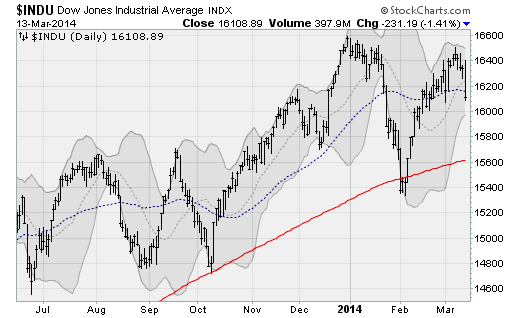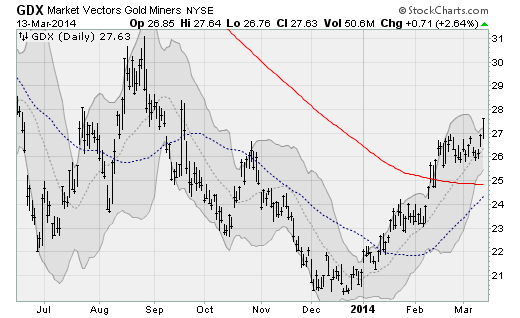The double whammy that slammed stocks
The stock market suffered its worst decline in six weeks as the "Putin is backing down" rally following the Russian president's press conference last week was fully unwound. The selling pressure came on like a flood and washed away early gains: It was strong, persistent and overwhelming.
The Dow Jones Industrial Average lost 1.4 percent to close at 16,108.89, finishing below its 50-day moving average for the first time since mid-February.
A few catalysts created this wipeout.
It started overnight in the Asian session as poor economic data out of China dampened spirits while traders in Manhattan slumbered. Industrial production grew less than expected. Fixed-asset investment was weak. And retail sales expanded at the slowest pace since 2004.
Economists at Societe Generale wrote in a note to clients that the data came in "vastly below our below-consensus forecasts, confirming the fast deterioration of China's economic growth entering 2014." Factoring in the already weak export data and the simmering trouble in China's financial system, and things aren't looking so great for policymakers in Beijing.
Especially as they try to balance the needs of short-term growth against the need to rein in a dangerous debt bubble and the desire for long-term structural reforms of their credit markets.
Another pressure point was the currency markets, which I've written about frequently lately. Stocks and other risky assets had benefited throughout 2013's record-setting performance from the consistent weakness of currencies like the U.S. dollar and the Japanese yen against the euro. Pair trades known as "carry trades" became popular as hedge funds would sell the weak currency short against the euro and use the proceeds to buy stocks.
Over the last few weeks, these trades have been under pressure as volatility has returned. The yen carry trade, proxied by the ProShares UltraShort Yen (YCS), collapsed at the start of the month on concerns over the Russian military deployment into Crimea. But then it ripped higher following that Putin press conference, pulling stocks along with it.
It's now sliding again, retesting recent lows -- and more deterioration looks increasingly likely.
The weakness in the yen carry -- caused, confusingly, by strength in the yen -- was helped by a dramatic intraday drop in the euro on comments from European Central Bank officials that new, extraordinary cheap-money stimulus measures could be forthcoming because a strong euro has damaged Europe's economy by trimming exports and pushing the inflation rate uncomfortably low.
Then there were no hints of any new stimulus measures out of the Bank of Japan earlier this week -- which disappointed a market expecting something in the wake of weak Japan GDP numbers over the weekend and the looming sales tax hike scheduled for April. That sent carry traders scurrying as the euro dropped hard against a strengthening yen. They sold stocks to close yen short/euro long positions.
The main beneficiaries from all the chaos were safe haven assets like gold, silver, precious metal mining stocks and U.S. Treasury bonds. All are areas I've been recommending for months amid growing concern over the state of the global economy. Just look at the way the Market Vector Gold Miners (GDX), an exchange-trade fund holding a basket of gold-mining stocks, is pushing higher.
In response, I'm adding the GDX as well as the Direxion 3x Treasury Bond Bull (TMF) to my Edge Letter Sample Portfolio.
Disclosure: Anthony has recommended GDX to his clients.
Anthony Mirhaydari is founder of the Edge and Edge Pro investment advisory newsletters, as well as Mirhaydari Capital Management, a registered investment advisory firm.


